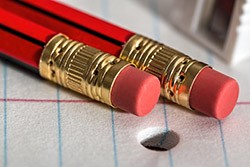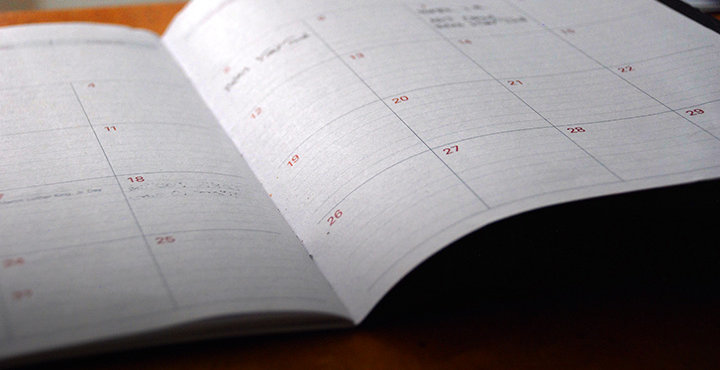I'm an obsessive note-taker. It doesn't matter what I'm doing; if I'm editing an academic essay, writing an informational article, or coming up with terrible puns, you can bet I'm that person drowning in tiny scribbled-on pieces of paper with a pen in my hand and another pen I've forgotten about tucked behind my ear.
You should be that person, too. A recent study demonstrated that effective note-taking strategies resulted in a full class grade of improvement across the board. That could be you! Or, if you're not a student, imagine what kind of improvements you could make at work or in your everyday life if you could manage your thoughts better through note-taking.
Imagine no longer! We'll show you how to take notes effectively with our foolproof five-step process.
Prepare
First off, you have to come prepared. Just as you wouldn't show up to a marathon without running shoes and a water bottle, you shouldn't show up to class or a meeting without paper or a pen. Plus, the person whose gear you're always borrowing and never returning may one day snap.
 Having the right equipment is necessary, so sharpen those pencils and make sure that pen hasn't run out of ink! And before you say that you're just going to type your notes, I'm going to stop you. Not only is writing by hand better for learning, it's also better for avoiding distractions. So, unless you really need that laptop, whip out your old pencil case and sharpen up those pencils. (But, remember, you're the sharpest pencil in the box, or, as my dad says, "the sharpest lightbulb in the drawer.")
Having the right equipment is necessary, so sharpen those pencils and make sure that pen hasn't run out of ink! And before you say that you're just going to type your notes, I'm going to stop you. Not only is writing by hand better for learning, it's also better for avoiding distractions. So, unless you really need that laptop, whip out your old pencil case and sharpen up those pencils. (But, remember, you're the sharpest pencil in the box, or, as my dad says, "the sharpest lightbulb in the drawer.")
When it comes to supplies, though, it's possible to go too far. I once had a friend with 20 gel pens and 10 different highlighters so she could color-coordinate her notes. If you're too focused on making your notes look pretty or organizing them in exactly the right way, you're not going to be listening at all, which is essential for taking notes. And that brings us to our next step . . .
Listen
This one may seem obvious, but it's a bigger struggle than most people might realize. If you're checking out Facebook on that aforementioned pesky laptop, you won't be listening to what the professor (or your boss!) is saying at all. That's the opposite of what you (or they) want.
Further, it's important that you're actually listening and not just hearing. Hearing happens just as breathing does—without thinking about it. If your professor or boss sounds suspiciously like Charlie Brown's teacher, you're hearing, but not listening. Listening requires conscious effort.
Just as my mother tells me to "listen—not to hear, but to understand," so should you when you're taking notes. Active listening is what helps you to process content. If you process content, you learn instead of memorize, which is necessary for applying content rather than simply regurgitating information at the exam and forgetting it two hours later.
Act
With a pen in your hand and your ears ready, it's finally time to actually take your notes. Listening to what the speaker is saying, jot down everything you think is important. If you're not sure something is important, write it down anyway. If the speaker mentions it again, chances are that it's very important, and you'll be glad you wrote it down. You could even quickly add a little star next to the note you already made.
It's also important to write down as much as you can. Think of it like clipping coupons. You don't know which you will actually use until you get to the store, but you can't use any of them if you don't bring any with you. It's the same with note-taking. You can revise your notes later, so it's better to have too many notes right now than not enough.
 Still, don't write absolutely everything down, or you risk becoming like the person in front of you at the cash register who's rifling through hundreds of newspaper clipping hoping to save ten cents on a five-pound box of spaghetti.
Still, don't write absolutely everything down, or you risk becoming like the person in front of you at the cash register who's rifling through hundreds of newspaper clipping hoping to save ten cents on a five-pound box of spaghetti.
Is the speaker speaking too fast for you to write down everything you want? Make sure you're being concise. If it's still too fast, you should always feel comfortable enough to ask the person to slow down or repeat something, if necessary. If that doesn't work, or if you're writing so fast you won't be able to read your writing later, consider recording the speaker. Just make sure you ask if it's okay first.
If the speaker agrees, you can use the Voice Memo app on your phone, or you could invest in a voice recorder. That way, you can listen to the notes later and copy only what's important. And if you lose your binder or your dog eats your homework, you still have all the notes from class. Success!
Emphasize
Now it's time to break out your highlighter. Refer to your syllabus or meeting review and recall the topic of the presentation. That will help you when you reread your notes. Highlight anything that immediately seems important, including terms, definitions, or anything you know you will be tested on (or asked about).
You should also highlight anything that was repeated throughout the lecture or meeting. If you recorded the presentation, it will be extremely easy for you to tell which terms and concepts were emphasized. This is also where you can color-coordinate, but keep it under control. When I was in university, I used two colors: one for important concepts I knew I would be tested on and one for specific terms or definitions that I should know.
Be judicious, though. You shouldn't see an entirely highlighted page or four neon yellow lines in a row. It's important that you emphasize these elements with a little bit of caution, because doing so will aid you enormously in the final step.
Revise
You wouldn't hand in the first draft of a paper, would you? (Okay, we all would, but it's not usually the best option.) It's the same with your notes. They shouldn't be subpar because you're only hurting yourself. If your notes aren't good, your results probably won't be, either.
So now's the time to revise. Just as writing is rewriting, note-taking is note-retaking. If you're anything like me, your notes are chicken scratch, and the majority of them are highlighted. That's okay! Now you can clean up your notes and rewrite them at your own leisure, without any pressure.
On clean paper, write out only the important points in a beautifully printed (or at least legible) font in a thoughtful and organized way. Doing so is not self-indulgent or simply visually appealing; studies show that hand writing information helps you retain it. The final step in our note-taking process actually helps you study, too. Tricked you!
Conclusion
Now that you have sharpened your pencils, listened to the best of your ability, scrawled at the pace by which summer vacation flies (i.e., really fast), picked out the important bits, and revised to your heart's content, it's time to actually study. Good luck with that. (Just kidding.) You know how to take notes effectively, so you can be confident in putting those notes to good use. Show them what you're made of!
Image sources: Rawpixel.com/BigStock.com, stevepb/Pixabay.com





